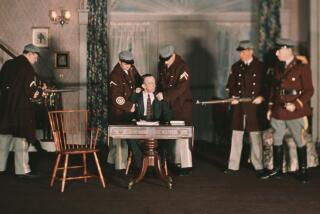Hard Right: The Rise of Jesse Helms by Ernest B. Furgurson (Norton: $16.95; 302 pp.)
- Share via
TO HIS ADMIRERS--and they are many--Jesse Helms is the implacable defender of traditional virtues, the watchman ever-alert to the encroachments of federal power and the menace of international communism. To his detractors--and they too are numerous--the North Carolina Republican is the obstructionist Senator No, a political version of Typhoid Mary, as the Raleigh News & Observer has called him, a zealot ready to embrace any cause that is sufficiently right-wing and antithetical to democratic processes.
To Ernest B. Furgurson, his unauthorized biographer, Helms stands in the long tradition of Southern demagogues, though he is far superior to his predecessors in both style and the breadth of his appeal. Helms, in Furgurson’s view, even outreaches Joe McCarthy, who had national support but who never understood how to move beyond his single-issue theme that Communists were everywhere subverting American life. Helms, of course, yields to no one in his assertions of anti-communism. But the Helms agenda embraces much else besides, including the entire conduct of U.S. foreign policy, education, the justice system, and most of all the place of religion and morality, as he defines it, in American life.
Is Helms a true believer, or is he a cynic?
Furgurson begins by asking this question, and in the end, the best answer he can offer--why not both?--is as apt as it is equivocal. There is no reason to doubt Helms’ passionate sincerity as he reaffirms his belief that American values rest primarily on family life, property ownership, proper spiritual orientation and, of course, anti-communism. There is no doubt either that he has made these beliefs pay off, as the vehicle for the most successful political fund-raising operations in the nation’s history, in the development of a formidable issues-based coalition, and as the philosophical foundation for the most persistent obstructionism seen in Congress in recent times.
To be the front man for groups that have so far raised at least $50 million and to be the rallying point for a collective of special-interest groups that individually are only “futile minorities,” in the words of a Helms aide, but that in coalition around a single leader constitute a formidable voting bloc, has endowed Helms with great political power. It is instructive to see how he has used that power from the Senate seat he has held since 1973.
He has not used it to win the affection or respect of his colleagues, nor has he even tried. To the exasperation of even such staunch conservatives as Barry Goldwater, Helms scorns the traditional political arts of compromise and coalition building. These are alien to his style and, quite often, to his objectives. His legislative clout instead comes from knowing and manipulating the Senate rules to make a desired negative impact. Over the years, he has introduced hundreds of bills and offered probably thousands of amendments not, as Furgurson says, with the aim of making laws but for the purpose of making friends, to broaden and cement his constituency.
All this has at times placed Helms in direct confrontation with Ronald Reagan. In many cases, Helms has come out the better in those contests. Largely with impunity up until now, Helms has been able to conduct his own foreign policy, with heavy emphasis on support for Latin American dictators. He has succeeded in placing ideologically compatible supporters in jobs throughout the government, while holding key administration appointments hostage for sometimes months at a time. If Helms is largely incapable of getting legislation passed, he is a master at blocking the bills of others, at least until the price he demands has been paid.
Give Helms credit for consistency. Where a George Wallace or a Strom Thurmond found it expedient to modify their public views on race as black voter registration in their states grew, Helms has not visibly altered his lifelong views on the proper place of blacks in society. Where other politicians pay at least lip-service to the values of the Bill of Rights, Helms remains unchanged in his belief that property rights are of greater importance than such “lesser” rights as free speech and assembly.
He is, in the words of James P. Lucier, his chief legislative assistant, “pre-political,” in that he views all issues simply as choices between right and wrong. His mind thus seems always to have been made up. When Jimmy Carter nominated Judge Shirley Hufstedler as his secretary of education, Helms took note of her membership on the board of the Aspen Institute for Humanistic Studies. “I don’t know what the purpose of the Aspen Institute is,” Helms said, “but the implication of its name bothers me.” He voted against Hufstedler. One has the feeling that, had he been born Iranian, Helms today would be a very successful ayatollah.
Furgurson, who is the Washington bureau chief of the Baltimore Sun, has heroically waded through thousands of pages of Helms’ prose and interviewed the senator and many of those around him to produce a competent journalistic biography of an inescapably important public figure. He concludes with a forecast that Helms’ power will continue to shape the direction that his party and the nation take, through this decade and even into the next century. That is a prospect that is certain to delight those who believe as Helms does, even as it disturbs just about everyone else.
More to Read
Only good movies
Get the Indie Focus newsletter, Mark Olsen's weekly guide to the world of cinema.
You may occasionally receive promotional content from the Los Angeles Times.










